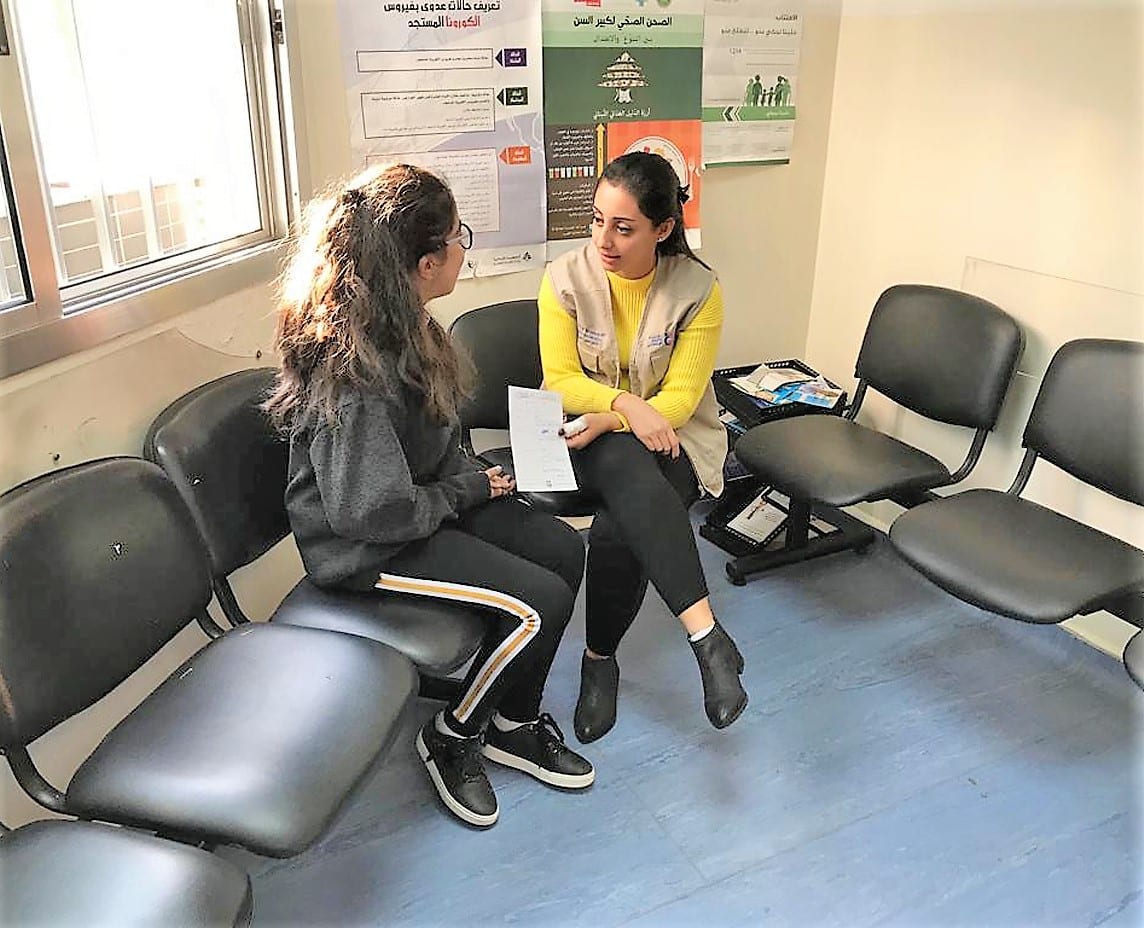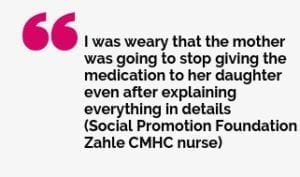
As told by the MH Nurse at the Social Promotion Foundation Clinic in Zahle:
Buthaina is a 13 year old girl, who has lived most of her life in the SOS village, an orphanage soon after her parents divorced. Her parents were both from different religions which were described as the main reason behind the marriage’s failure.
At the orphanage, the mother used to visit her regularly, but the father was absent. The mother remarried, but was unable to get pregnant from her second husband, so the husband proposed that she brings her child to live with them, and she did!
Once she brought her to home, the mother was given psychotropic medication to give to her daughter as part of her treatment. The mother was furious and did not understand why her daughter was being given medication, so she threw them all away, and stopped giving Buthaina her Risperidone abruptly. It was only a matter of time before she started showing symptoms again; she lied to her mother and step-father about everything, and started enjoying watching them fighting, she broke things around the house, she was aggressive and hit her mother repeatedly among other things.
“I remember the day Buthaina’s mother first came to the clinic, she was a walk-in patient who heard about the services offered by the Community Mental Health Clinic. She came in looking around her as though afraid that someone might recognize her. She talked in a low voice and asked to see the psychiatrist.”
It was explained to her the procedure that she needed, first to sit with a case manager for her to assess the case and check if there was a need to see the psychiatrist, but the woman totally refused and stood to leave. The psychiatrist then walked into the room and the mother from the discourse with the nurses understood who she was, so she took her to the side and started talking to her. The psychiatrist here asked the nurse to set an appointment with her daughter to see and observe.
Buthaina was diagnosed with conduct disorder, “a repetitive and persistent pattern of behavior in which the basic rights of others or major age appropriate societal norms or rules are violated,” and was prescribed Risperidone with therapy. The mother was so desperate to try anything to help herself with her daughter, but she refused therapy. The nurse explained that it was very important to abide by the dosage and time of the medication and what would happen if the patient was overmedicated or if the medication was stopped abruptly.
 Also the major side effects of this medication were explained clearly including extrapyramidal symptoms (side effects of antipsychotic drugs that include dystonia – continuous spasms and muscle contractions, akathisia -motor restlessness, parkinsonism – characteristic symptoms such as rigidity, bradykinesia -slowness of movement, tremor, and tardive dyskinesia -irregular, jerky movements), and what they encompass.
Also the major side effects of this medication were explained clearly including extrapyramidal symptoms (side effects of antipsychotic drugs that include dystonia – continuous spasms and muscle contractions, akathisia -motor restlessness, parkinsonism – characteristic symptoms such as rigidity, bradykinesia -slowness of movement, tremor, and tardive dyskinesia -irregular, jerky movements), and what they encompass.
The second time, the patient came with her mother for a follow-up with the psychiatrist and the patient showed immense progress with little side-effects from the medication. Everyone was happy and satisfied. The psychiatrist asked if the patient kept taking the medication as she had no alterations. The mother was very unhappy and wanted to take her off of her medication since she saw that her daughter was doing well, and she thought she was cured. Here the nurse explained that a psychiatric illness is not something that a person could be cured of completely, that it is a chronic condition that could be managed with lifestyle alterations, medication and psychotherapy much like diabetes and hypertension.
“I was weary that the mother was going to stop giving the medication to her daughter even after explaining everything in detail. Even at home, I was thinking about this case, I could not get it off of my mind for the entire week, so I decided to call the mother and ask her about her daughter, and it was a good idea. The mother was trying to temper Buthaina off of the medication out of her own volition and her daughter was starting to show some symptoms again. We fixed the dosage of her medication with the psychiatrist and I called that woman every week for the next 3 months to make sure that everything was going ok with the patient. I do not consider myself to be intrusive or forcing the mother to stick to her daughter’s treatment, but I was doing what I thought was best for the patient.”
Since the start of the EU Madad REHBAS funding in March 2018, 98 children/adolescents (35 girls and 63 boys) have been assessed and treated at the CMHC for conditions including: intellectual disability, epilepsy, autism, attention deficit hyperactivity disorder (ADHD), conduct disorder, learning disabilities (like dyslexia), schizophrenia, post-traumatic stress disorder and adjustment disorder.
The project is funded by the General Directorate for Neighborhood and Enlargement Negotiations (DG NEAR) of the European Commission and is based on the general objective of the European Union Regional Trust Fund in Response to the Syrian Crisis (“MADAD Fund”) of responding to the “needs of Syrian refugees in neighboring countries, as well as the communities that host refugees and their administrations, particularly in terms of resilience and speedy recovery.”
We have not showed the name of the nurse as she indicated, in order to preserve her identity. The patient name also has been changed for the same reason.

